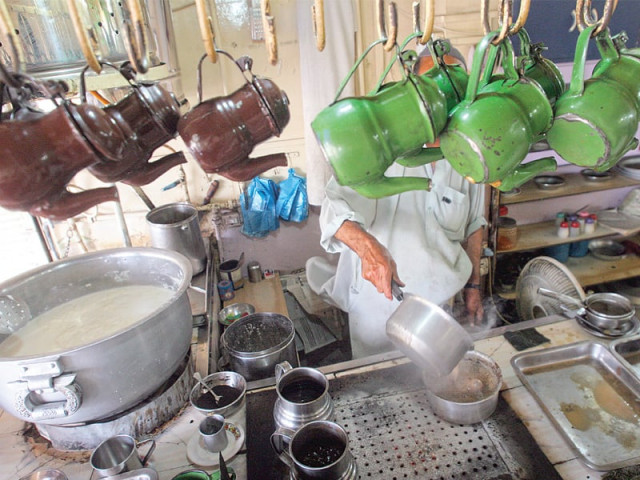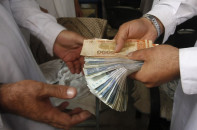Breakfast in Karachi: Would you like your tea shaken or shot at?
For Rs25, the chai wala cannot assure your safety but can promise a steamy cup of tea.

Most of these dhabbas or tea hotels are owned by men from Quetta or Khyber Pakhtunkhwa. They can be found in every corner of the city, from Gadap Town, New Karachi and Malir to Gizri, Keamari and Korangi, serving green tea, doodh patti and malai parhatas.
Unfortunately, due to the deteriorating law and order situation of the city, these chai dhabbas and tea hotels are closing down. According to 43-year-old Allahuddin, he had to leave his tea hotel in Ancholi because he was afraid someone would kill him. “My tea hotel, Quetta Al-Sadaat Hotel, was attacked by four men on two motorcycles two years ago at 11pm. One of my employees was gunned down and four others were injured,” he said while talking to The Express Tribune. “I just couldn’t sit there waiting for a bullet with my name on it.” Allahuddin now sells ice in Sohrab Goth.
“I closed the dhabba for seven months after the incident and gave it to a man from Hazara on rent,” he said. “Even though I do not make much from selling ice, I feel safe.”
Naseeb, a mechanic at Karachi Port Trust, is a regular at Shalimar Hotel in Sultanabad. “I come here every night for some doodh patti and to catch up with my friends,” he said. “In the beginning we used to sit here till midnight but now we go home around 10pm. It is risky to stay out at night.”
Mohammad Qasim, who owns a tea hotel in Empress Market, said that most of the people in the neighbourhood preferred to bring their guests to his hotel because their apartments were small. “Eating here is quite cheap. We have a large number of regular customers who pay Rs20 for chai and Rs25 for doodh patti,” he said. “Our menu is short but we also serve parhatas and omelets.”
While talking to The Express Tribune about customers, Qasim, who is from Quetta, said that they were very busy in the mornings and evenings. “A lot of people come and have their dinner at the hotel,” he said. “However, we are not doing so well in terms of business because of the target killings and attacks on tea hotels.”
Qasim, like other tea hotel owners, is fed up of waiting and feeling insecure. “Working at a tea hotel has become risky,” he said. “More than a dozen people have been killed while drinking or brewing tea. A lot of my friends have left the business and have started working as labourers. Some of them have even left the city because their hotels were attacked.”
It’s a tough life
Abdul Bari Kakar, the president of Empress Market Association, explained that most of the tea hotel owners had either borrowed heavily from family and friends or sold their properties back home to start the business.
All Quetta Hotel Union’s Noorullah told The Express Tribune that more than 1,400 tea hotels in the city had closed down because of the violence. “Most of these hotels are easy targets. In the last three years around 350 employees and 12,00 customers have been killed,” he said. “When the Bilal Quetta Hotel in Par Ganj was attacked, over 700 tea hotels were temporarily shut down. We had asked our people to lie low till things went back to normal.”
DIG Imran Yaqoob Minhas claimed that they had been unable to determine the motive behind the attacks. He said that it could be a reaction to the Hazara killings.
Published in The Express Tribune, June 21st, 2012.



















COMMENTS
Comments are moderated and generally will be posted if they are on-topic and not abusive.
For more information, please see our Comments FAQ